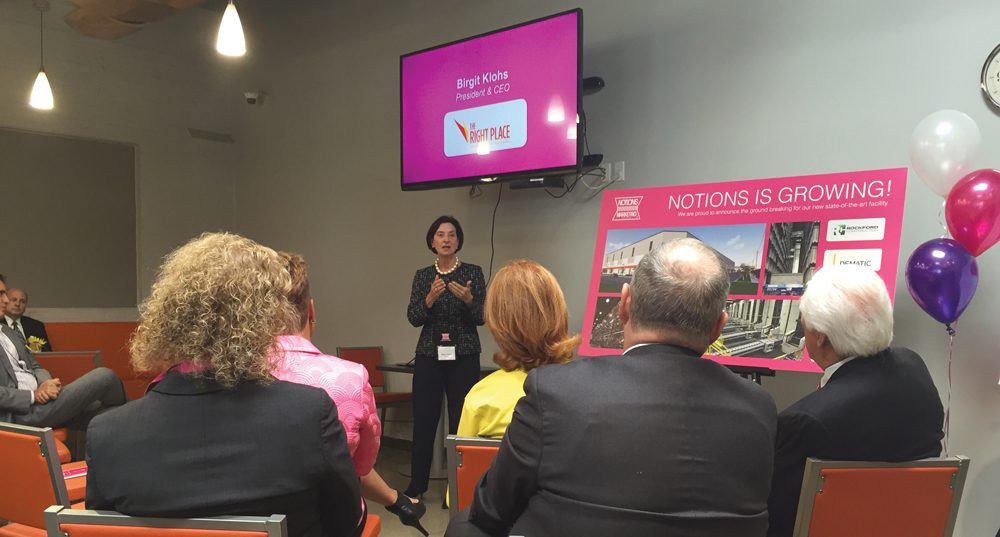

On a national level, organizations set up to cooperatively “market” the region they call home are increasingly recognizing the competitive nature of the business landscape.
And there’s no hiding that fact. Virtually every region takes the role seriously, highlighting its strengths, downplaying its perceived weaknesses, all with a goal of bringing more economic activity to its particular area.
For sure, more organizations are now taking a cooperative approach, setting aside as much of the competitive tendencies as possible in favor of one that recognizes a “we’re in this together” strategy.
That includes West Michigan, where The Right Place Inc., an economic development agency, has set out to do just that.
Its CEO, Birgit M. Klohs, stands among some of Michigan’s most powerful people – heading trade missions from Australia to China to Europe, doing interviews worldwide about West Michigan and its entrepreneurial environment, as well as serving as Michigan’s international economic-development specialist.
But Klohs says some of her best work happens behind the scenes and without accolades. Her goal now – as it has been since she joined the organization some 30 years before – remains the same: To highlight the vast opportunities for growth within Grand Rapids and its surrounding communities.
“My job is to retain jobs, to create jobs and to attract jobs to this community and to this region and I’m very, very passionate about it,” Klohs says. “My belief is creating good jobs is the best social service we can provide.”
The Right Place has an impressive track record. Under Klohs’ leadership, it has assisted thousands of West Michigan companies to invest more than $4 billion in capital and create more than 40,000 jobs throughout the region. In 2015, The Right Place completed 16 economic development projects in the region, resulting in 1,327 new and retained jobs, $44.2 million in payroll and $169.9 million in capital investment.
In recent years, The Right Place has had many home runs, one being to keep SpartanNash’s headquarters in West Michigan after a merger.
It also brought in China’s Dicastal to make automotive wheels in Greenville.
And then there was the grand slam of them all: snagging Nevada-based Switch to build a regional data center in the former Steelcase pyramid in Gaines Township.
In February, Global Trade magazine ranked The Right Place as one of the top 18 economic development corporations in the nation.
Helping to manage the organization is more than full-time job, given its $2-million annual budget, regular trade missions and staff of 19 committed individuals. Oh, and Klohs also serves on a bevy of boards, including the Advisory Council on Agriculture, Small Business and Labor for the Federal Reserve Board of Chicago. It’s a busy workload, to say the least.
Despite her many accomplishments, Klohs stays grounded. She has talked publicly about her mistakes, even giving a talk about one of her most devastating career blows during a Failure:Lab event. She shares the success The Right Place has enjoyed with its staff, the board and its partners. But make no mistake: Klohs is a powerhouse in and of herself.
A leadership icon
A native of Germany, Klohs speaks three languages. But it could be said that her greatest skill may lie in being able to translate Michigan’s potential to a wider audience.
“I am always learning from my colleagues. Learning is never ending,” Klohs says. “One of my mentors once told me: ‘If we don’t care who gets the credit, we get a lot of work done.’ That is why I believe it’s not about us. It’s about the company that wants to create jobs and invest. We have to remember that. And that should always be our focus: What is the best thing for the company.”
This insight is why local leaders such as Kelly Rossman-McKinney describe Klohs as a dynamo.
“(She) is a leadership icon – not just in West Michigan, where she has used her leadership skills and talents to the significant economic benefit of the region – but throughout the state,” says Rossman-McKinney, who works at Truscott Rossman, a public relations firm. “(Klohs) is revered as one of the top economic development experts and many – including me – would argue that she is Michigan’s top economic development expert.”
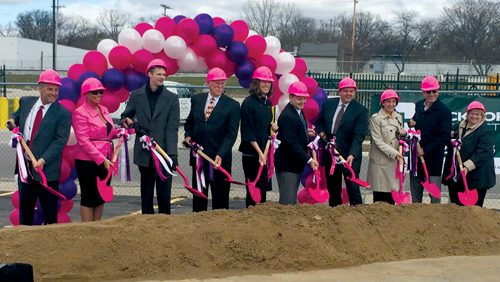
Admiration for Klohs runs both deep and specific. “She is skillful, disciplined, clear-headed and focused,” adds Rossman-McKinney. “Best of all, she has little patience for big talk with no action and will cut to the chase in almost any situation she encounters.”
It may be little wonder, then, that this dynamic woman captured the attention of a group of Grand Rapids leaders when they needed someone to take the helm of their new economic development organization. Klohs has the kind of resume that serves as a reminder for why she is known as a staunch negotiator, a brilliant communicator and strong advocate for West Michigan – it is where, after all, she has lived for nearly four decades, fully committing herself to bettering the communities she calls home.
Klohs says that while her favorite high-school subjects were history and political science, she went on to earn a bachelor’s degree in corporate finance at Western Michigan University before going on to the Economic Development Institute at the University of Oklahoma and completing the professional economic development finance program through the National Development Council. She also attended Harvard University’s program on negotiation.
The board hired Klohs in 1987 right after she finished a stint at Grand Valley State University, where she served as assistant director of the Office for Economic Expansion.
The Right Place, the right time
The story of The Right Place starts around 1985 when the Grand Rapids Area Chamber of Commerce and the Greater Grand Rapids Economic Area Team created something that was unusual for its time: a public-private economic development organization with the sole purpose of retaining jobs and attracting new employers to West Michigan. It had only been done once before in the Midwest and never in Michigan.
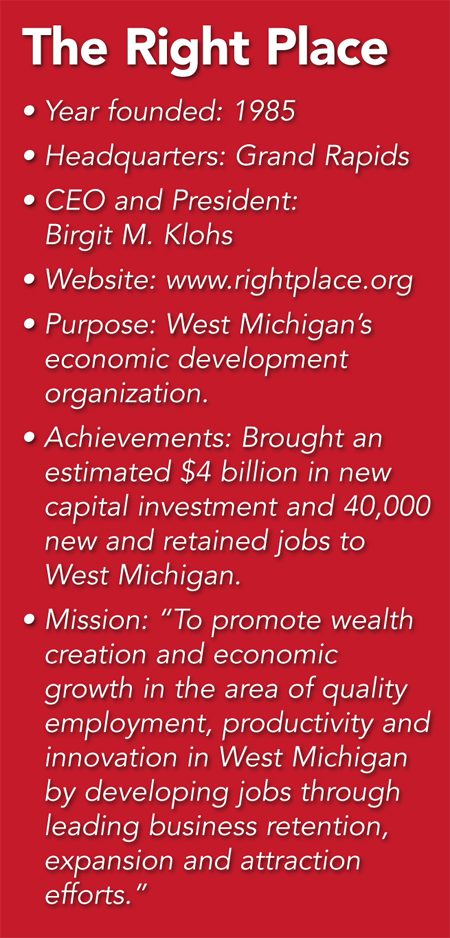 Klohs says the idea for the name came about during a meeting of founding members, each of whom were asked by a consultant why their companies had located in the area.
Klohs says the idea for the name came about during a meeting of founding members, each of whom were asked by a consultant why their companies had located in the area.
And the most frequent response included the phrase: “We’re here because it’s the right place for us.”
The timing around The Right Place’s creation was significant as well, Klohs says, who recalls the “very dark days” across the state that seemingly defined the mid-1980s.
Michigan’s unemployment rate was around 17 percent; in Grand Rapids, it was around 11 percent. More than a dozen West Michigan CEOs and leaders from businesses as varied as Amway to Meijer to Steelcase were meeting quietly to discuss their concerns.
“They wanted to look at the fact that this region did not have an economic development organization. If a company wanted to expand, if a company was new to the area and wanted to locate here…Well, there was no door to walk through, to put it simply,” Klohs says. “They knew if we didn’t have a healthy and growing region, we wouldn’t be able to attract talent to our companies.”
The leadership group conducted a community analysis and the results came back with a strong recommendation to create a one-stop organization for business development.
The idea – which was revolutionary at the time – was to fund it through a public-private partnership, with 80 percent of the funding coming from the private sector. The remaining 20 percent would come from municipal partners and foundations. That ratio, Klohs says, continues to be the funding model for The Right Place.
That said, one significant change has occurred.
“Initially (The Right Place) was built around attracting new businesses to the area, which is one of the most interesting parts of our job,” adds Klohs. “(But) it was difficult to attract new companies when we weren’t taking care of our home-grown businesses. That’s when we added a retention and expansion component to The Right Place’s strategy – and that too has stood us in good stead.”
It’s something Klohs believes in strongly.
There’s this: “If you don’t know what’s going on in the minds of your companies, you’ll be surprised when they do something you were not prepared for,” she adds.
And this: “Taking care of the companies you already have is about developing long-term economic development strategies. We’re not chasing a shiny new penny every five minutes. We are very deep believers that you have to take care of your base first. Our base is around manufacturing, high tech manufacturing, life science industries, agriculture and food processing industries, IT and design sectors. That’s always part of our operations.”
Having a public-private model also means that Klohs understands the importance of tracking her programs, offering insights into the numbers and studying everything for whether it passes muster as a long-term strategy.
“My belief is if you don’t measure it, you don’t do it,” she adds. “If you don’t measure goals, if you don’t have measurable metrics that go along with your strategic plan, that plan is going to sit on your shelf.”
Klohs is deliberate about referring to a group of people who fund the organization—about 250 in total—as investors in The Right Place.
“We call them investors because we are very strong believers in a return on that investment,” she notes. “Our return on that investment are jobs, payroll and investment from companies that are expanding or relocating here. If I go back to one of my investors, I can say exactly what we’ve accomplished at any point in time.”
Many partners
During the past three decades, Klohs and her team have worked with an array of businesses. She was a key player in the 1990 project to recruit the first major foreign company to West Michigan. Known then as Behr Industries, the German auto supplier settled its new plant that made molded wood veneers in Grand Rapids. Today, NBHX has more than 500 employees in Comstock Park.
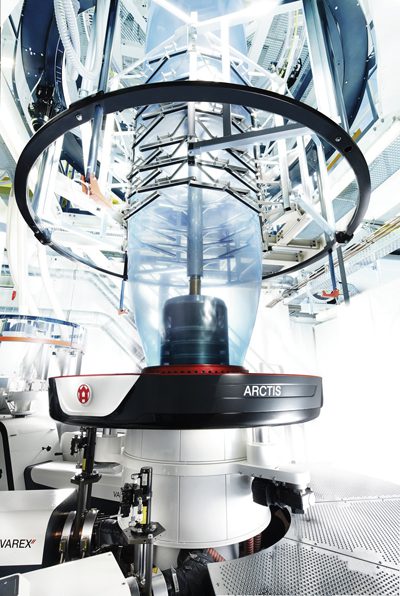
She also had a hand in setting up the Michigan Turkey Producers Co-op, created in early 2000 after Sara Lee Corp. cancelled its contract to process turkeys from 15 West Michigan farmers. Now, Michigan Turkey Producers Co-operative has some 700 workers in two plants.
Another achievement was the retention and redevelopment of the American Seating Co. campus on the west side of Grand Rapids. The Right Place worked with the company and Pioneer Construction on the $26-million brownfield project, which brought new offices, housing and manufacturing to that area.
The projects flow from a series of three-year strategic plans, with the current one (that began in 2014) currently being refreshed (essentially resetting the bar after meeting many of the original targets).
With that three-year plan, The Right Place and its partners have brought in more than $500 million in new investments to West Michigan, not including the massive Switch investment, which itself is worth $400 million.
That public-private partnership is a must for something as aggressive and advanced as The Right Place to work, Klohs believes.
“We have never veered from our public-private partnership. We cannot do this without our municipal partners. I don’t control land. I don’t control the water. I don’t control sewers. Those are all owned by others. What we do as an organization is to make sure all of our partners are on the same page,” she adds. “We bring all of them together that need to help a potential company with its location plans or expansion strategy. And we stay in the middle until the deal is done.”
The one deal that didn’t work out inspired her Failure:Lab talk, during which she spoke about how longtime Greenville manufacturer Electrolux simply could not be convinced to stay, even after seemingly endless negotiations to convince it otherwise.
Ultimately, the plant (and its 2,700 jobs) moved to Mexico.
Klohs, who is adamant she will “never buy an Electrolux product,” says the experience taught her and others that failure and success are neither good nor bad. Both are part of her job. Both have value. And she believes that teamwork across municipalities creates more positive momentum than old-fashioned competition or resentment when it comes to economic development.
“Most people understand that if a company does locate in Community A, that doesn’t mean Community B lost,” Klohs says. “It’s more nuanced than that. People who work for that company may live in Community B, shop in Community C, visit Community D. Collectively, we’ve created an understanding with our partners – that one company’s influence in terms of investment spreads like water through the region.”
That is why Klohs says having strong, long-term relationships with city leaders is key to doing her job and doing it well.
“An example is when we had a situation with a very high-tech company that was either going to move within the county into a new facility or go to South Carolina,” she recalls. “We had to tell the mayor of one community that our best choice was to move (the company) one community over for a building that suited them or lose almost 400 jobs. That’s a hard conversation to have with a mayor, yet he totally understood. The plant ended up moving about 3 miles down the road.”
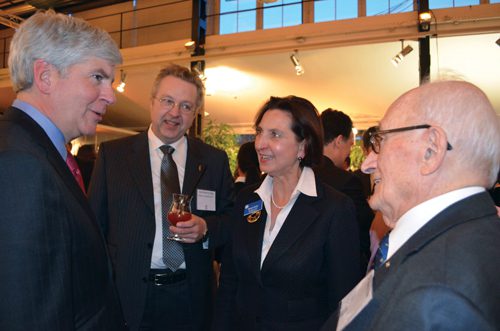
But the west side kept those jobs. Klohs kept the relationship with that mayor. And she continued her mission of building up not only the Grand Rapids area and the west side, but also Michigan as a whole.
“We are collaborative here – and it’s for the greater good,” Klohs says. “Michigan is known for having economic developers who are long termers. We’re very loyal to the state – and that also stands us in good stead because you transcend political changes in Lansing so you can continue to do your job. It’s the only way it can work.”
Every day offers Klohs and The Right Place a new opportunity, a new challenge. With her eye on the future, Klohs is working closely with the community colleges in her region, as well as with Michigan Works! to determine what skills employers need, how to put those skills into the local workforce and to keep jobs in Michigan. This is especially important in terms of manufacturing careers, Klohs says, helping today’s high-school and college kids know that making products is just as important as high tech or other industries.
“We need to look at the next generation,” she adds. “There are thousands of skilled jobs going unfilled in Michigan and elsewhere. I think if we can figure out how to get young people excited again about working as tool and die makers, we can do something special. They need to know these jobs are not your grandfather’s dirty industrial plant – you really need to have the right skill sets today.”
Klohs also understands how competitive the marketplace is now, confirmation of which comes in the form of comments from friends, as well as pitches from around the globe, as other cities seek to woo companies away.
“You have to keep good track of our competition; it’s an evolving issue. The pace has picked up so rapidly that you really have to stay ahead of it. It’s constant change.”
Klohs’ commitment to the Grand Rapids area is likely to grow as the years continue. She serves on a variety of boards that have made the city what it is today and Klohs uses the word “vibrant” to talk about her adopted hometown.
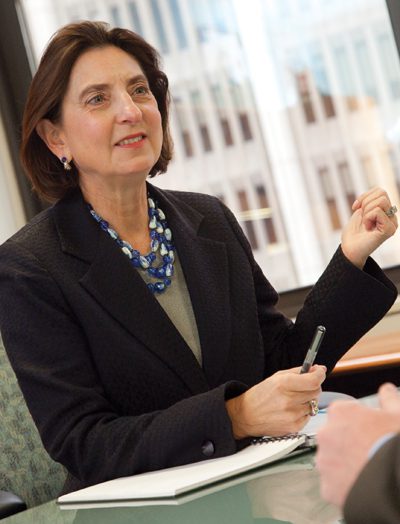
“It’s amazing what we have done. We are beginning to come into our own. The reason (the west side is successful) is the central city; Grand Rapids has come a long way. There’s something to do here for everybody, whether it’s the arts to the outdoors to Lake Michigan. It truly appeals to a lot of people.”
Knowing that The Right Place is one of the organizations that has made that possible makes her extremely proud. But she also gives credit to those who came before her organization, those who are working daily at The Right Place and the many community partners for making her work not only possible but sublimely enjoyable.
“It started before I arrived. It started when the community of business owners got together and said, ‘Let’s build a world-class hotel.’ Then they said, ‘Let’s build the Ford Museum.’ Then they decided to put an arena downtown. People pulled together,” Klohs adds. “There are so many great additions in recent years, as well, like the new YMCA and Grand Valley. You know, we have great campuses downtown; there are now more than 90,000 students in a 13-county area. No one thinks of us as a college town, but we are. And these are young people we hope will stay.”
But she admits that getting people to stay – young and old – takes work.
“It’s one of those chicken and egg things,” Klohs says. “The arts are thriving because we have people with good jobs who can support the arts. People are happy to be here because of the arts. … To me, Grand Rapids is about entrepreneurship and entrepreneurs who became philanthropists and who collaborate under a common vision.”
And getting business to move together toward a common goal takes teamwork.
“At the end of the day, I like metaphors,” Klohs, says, laughing. “We’re in a ship called Michigan. We’re only as strong as all parts of that ship. We all had better be on that ship making sure it floats right. That is why we do what we do. We want to do our part to make Michigan and our part of West Michigan as strong as possible. And that happens through investment, new jobs, new payroll. Those ripple through the community – people buy homes, they go shopping. That attracts more retail, more businesses.”







